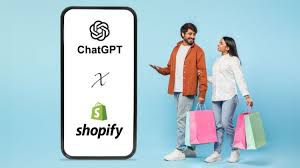
Imagine asking ChatGPT to recommend a nice pair of sneakers, and instead of giving you a list of websites to check out, it actually shows you the shoes, lets you confirm the price, and even pays for them right there in the chat. That is no longer a futuristic dream. OpenAI, the company behind ChatGPT, has just announced a new partnership with Shopify, which has the potential to transform the way people shop online.
Shopify Meets ChatGPT: What’s Happening?
OpenAI has rolled out a new feature called Instant Checkout. The idea is simple yet powerful: instead of clicking through links, bouncing from one website to another, and filling up shopping carts before paying, ChatGPT will now enable users to make purchases directly inside the chat.
The feature is initially rolling out with Etsy, and Shopify stores will follow. Since Shopify powers millions of online shops around the world, including many in Nigeria, this development could have ripple effects on Nigeria’s eCommerce scene. For shoppers, there will be no extra charges for using the feature. The system is designed so that merchants, the actual store owners, will pay OpenAI a small commission for every sale made.
How It Works for Everyday Business Owners
Typically, buying something online involves several steps. You start by searching on Google or scrolling through Instagram ads, then you land on a store page, browse the products, add one to your cart, and finally make a payment. With ChatGPT and Shopify working together, all of that can happen in a single, seamless conversation. You simply ask for what you want, see the options, and check out instantly. For anyone who has ever abandoned an online cart because the checkout process felt too lengthy, this could be a big deal.
It also means more visibility for Shopify sellers. Many Nigerian entrepreneurs rely on Instagram ads or word of mouth to drive customers to their online shops. With this system, their products could appear inside ChatGPT whenever someone searches for recommendations. Imagine asking ChatGPT for “affordable Ankara gowns with delivery in Lagos” and your store’s listings appear right there in the chat. That kind of exposure could put small businesses in front of customers they may never have reached on their own.
Why This Matters to Entrepreneurs
For sellers here, this development should be taken seriously. Running a Shopify store will now require even more attention to detail. Product photos must be clean and professional, descriptions have to be accurate, and shipping information should be up to date. Since ChatGPT will pull directly from store data, messy or incomplete listings could mean your products never even make it into the recommendations that buyers see.
It is a new kind of visibility game, and those who prepare early will benefit the most. Imagine your store being one of the first Nigerian-owned businesses to pop up directly inside ChatGPT whenever someone searches for products that match what you sell. That is a huge competitive advantage.
READ ALSO: Step-by-Step Guide: How to use ChatGPT to apply for jobs
What Could Change for Shoppers Too
For buyers, this integration could make online shopping feel less stressful. Instead of scrolling endlessly through Instagram or worrying about fake vendors, people could find verified listings directly inside ChatGPT. It could feel safer and more convenient, especially if local stores adopt it.
Of course, there will still be challenges. Shipping costs remain high, and delivery timelines are often unreliable in Nigeria. If those problems are not resolved, buyers may still feel hesitant to rely fully on the system, regardless of how sleek the chat experience is.
The Bigger Picture of AI and E-Commerce
This partnership hints at a deeper shift in people’s shopping culture in the future. Instead of the traditional “Google it” routine, we may soon be telling each other to “ChatGPT it.” If AI tools like this start handling product discovery and checkout in one place, then the old way of clicking through multiple websites may slowly fade.
That said, there are catches. The rollout is starting in the United States, so it may take a while before Nigerian stores can plug into the system. Merchants will also have to part with a commission to OpenAI, which could affect profit margins in a market where logistics costs are already high. Trust is still a big factor. Nigerians are cautious with online payments, and while OpenAI is using Stripe, a global payment processor, many buyers are more comfortable with Paystack or Flutterwave.
Still, one thing is becoming clear: shopping through conversations is the next frontier. Just as WhatsApp replaced SMS and TikTok took over from Vine, AI-powered chats could slowly replace the old search-and-click routine. The ChatGPT and Shopify partnership is more than just a shiny tech headline; it is a sign of where online shopping is heading. For Nigerian buyers, it promises less stress. For Nigerian sellers, it offers a new global stage. It might not fully land here yet, but when it does, the dream of stress-free shopping could come much closer to reality.








